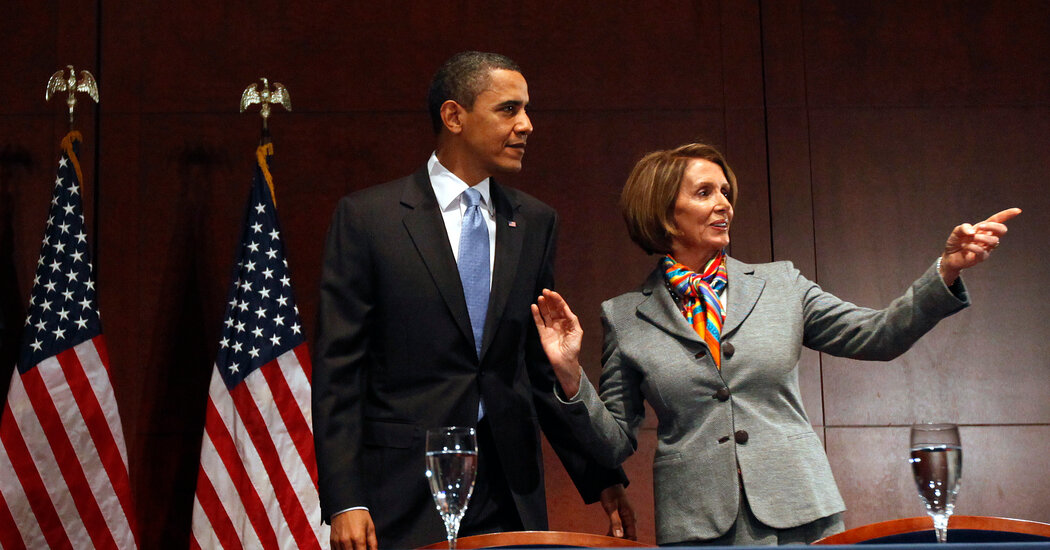
It wasn’t that long ago when health care was one of the most important issues in American politics. It was at the heart of the fundamental conflict between the two parties: whether the government should tax, spend and regulate to redistribute wealth and help working people.
Nowadays? Health care hasn’t been front and center for years. In the final New York Times/Siena poll of the 2024 campaign, less than 1 percent of voters said health care was the most important issue to their vote. To the extent there’s a political battle over health care today, it’s mostly because Democrats forced a government shutdown over it.
That’s not to say there haven’t been major developments in health policy. The Republicans’ spending bill this summer derived most of its savings through health care cuts. And an expiration of Obamacare subsidies will affect millions of people.
These developments have laid the groundwork for the Democrats to force a shutdown over health care, and they may ultimately benefit from it politically. But if you want to understand the depth of the challenge facing them in the Trump era, it’s telling that the party needed to use its leverage and force a shutdown in order for health care to capture any significant attention.
With all the second-guessing of the party’s leadership over the last few years, it’s worth noting there’s political logic to this maneuver. It might lay the groundwork for next year’s midterm Democratic campaigns to focus on health care, if raising the public’s awareness of expiring health care subsidies and Medicaid cuts makes it easier for Democratic congressional candidates to attack Republicans for supporting the big G.O.P. bill. There’s even a chance it may succeed in getting Republicans to extend health care subsidies.
But health care is unlikely to return to the center of American politics — not anytime soon. Oddly enough, one way to tell is that Republicans seem unusually willing to compromise on Democratic demands. This has given the impression that this shutdown is going better for the Democrats than is typical. It’s essentially inconceivable that President Barack Obama would have been as accommodating toward Senator Ted Cruz’s demands during the 2013 shutdown fight over the Affordable Care Act. Republicans are so willing to compromise only because opposition to government-subsidized health care is no longer a defining issue for conservatives. It’s not 2013 anymore.
Instead, politics today is about the issues that propelled the rise of conservative populism, like immigration or the backlash against “woke,” and the issues provoked by the rise of conservative populists, like executive power and democracy. The rise of conservative populism partly reflects that these new issues are extremely potent, but it’s also because conservative populists — not only in the United States, but around the postindustrial world — have deliberately sought to neutralize the 20th-century debate over the social safety net.
Unlike George W. Bush or Mitt Romney, Mr. Trump promised not to touch Social Security or Medicare. Since his failed effort to repeal Obamacare in 2017, Mr. Trump has mostly shied away from opposing it publicly. There’s no obvious appetite for rolling back the program on a scale that might bring the issue back to the forefront. This year’s Medicaid cuts were mostly obtained through the politically palatable means of adding work requirements; Democrats have not focused on trying to roll back those cuts during this shutdown fight.
There’s another reason health care has drifted away from the center of American politics: Democrats are not pushing another major expansion of government-provided health care. Since the enactment of the Affordable Care Act, there hasn’t been much room for Democrats to push further. It’s not a perfect system, but 92 percent of Americans have health insurance, and 81 percent of the insured say their health insurance is “good.” The tallies are probably larger among voters, who tend to be more affluent than nonvoters. With so many Americans insured, there is not a large constituency sure to benefit from a major expansion of government-provided insurance. Instead, there’s a majority who could be unhappy to have their private insurance plan replaced by a single-payer government plan.
This story on health care is part of a broader pattern in American politics during the Trump era. On issue after issue, the defining fights of the 20th-century Democratic Party have mostly been resolved, and usually resolved in favor of the Democrats. They made enormous, even unimaginable progress toward solving the problems they sought to address. While plenty of issues remain, 20th-century liberalism — like new government programs or expansions of rights — has relatively few new opportunities to transform American life. Today’s high prices, large deficit, low unemployment and high interest rates have only made it more challenging to contemplate additional government spending.
For a long time, Democrats succeeded politically by promising to protect postwar prosperity against conservatives who would roll back Medicare and Social Security, or against unfair trade deals that shipped jobs overseas. With Mr. Trump promising to protect entitlements and campaigning against free trade, this winning Democratic playbook is gone.
Trade, immigration, the rise of conservative populists and a new left, and Mr. Trump’s own actions have supplied the beginnings of a new political conflict. There’s reasonable political ground for Democrats on many of these issues, but unlike health care these are not the problems that the modern Democratic Party was built to address. They’re either issues where Republicans have an advantage because they can frame the problem as a kind of liberalism gone amok, like crime and immigration, or they’re issues that might divide Democrats, like trade or foreign policy.
Democrats would rather turn back the political clock, and fight over health care.